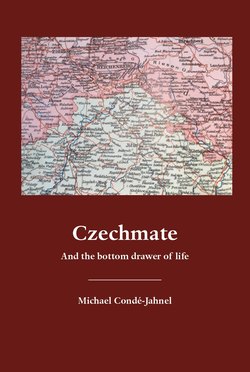Читать книгу Czechmate - Michael Condé-Jahnel - Страница 12
На сайте Литреса книга снята с продажи.
Chapter 5 Halifax, February 2007
ОглавлениеMy gaze was fixed on the apartment building across the parking lot below. The building’s drab appearance was a mirror image of the one I had taken temporary refuge in since parting with Rachel last year. Whenever I remembered to open the once white horizontal blinds, the opposite twelve stories would insinuate themselves across the fullness of the living room window. My building had seen decades of transients moving in and out. Many of them probably never had a fixed address for long. For now I had stayed in the center of the peninsula that was downtown Halifax, its familiarity providing the comfort of continuity.
My mind right now was nowhere and everywhere at once. The last of my conversations with Edi a few weeks back had left me somewhere between early childhood memories and now. Most of my life was behind me. How much of the present was connected with the past – hell, not just connected, but a direct result of it? It was a question I had asked myself occasionally, but never dared fully answer.
Of course, I told myself, if only Germany had not been at war and if only, as a result, the Czechs and Russians had not driven my family out – well, then everything would have been different. But different in what way? There would have been no salivating over a slice of dry rye bread for half an hour at age seven. No cold attic storage converted into a makeshift bedroom. No food stamps providing a few days of meagre sustenance. No occasional black market spoils thrown in, to carry the family to the next ration. No mended hand-me-downs that felt confining and hot in summer and itchy and stiff during the winter. And no wayside chapel on the outskirts of Hamburg, spared during firestorm bombings, pretending to be a single-room schoolhouse for early grades. Those were the easy questions with the obvious answers.
And yet, was it only the lack of food, clothing and shelter during my early years that mattered?
Painful and debilitating as their absence might have been at the time, were they not merely the tip of the iceberg? What about the fact that I had hardly seen my father for years? What about the images of dead-tired, wounded German soldiers that had passed by the living room window of my parents house for several days on? What about the absence of play, the lack of contact with other children during those years?
It seemed impossible to draw a fine line between the hideous crimes against humanity by Nazi Germany in the name of Aryan dominance and the vengeance with which the ethnic majorities in territories occupied by Germans had sought to cleanse them of any German presence. At least the latter forces had not sought complete annihilation, but a cleansing and removal of their war time occupiers. Had Hitler not used the presence of German minorities in neighbouring countries as ‘raison d’etre’ for invasion? And was, therefore, so reasoned the Allies, the removal of these German minorities and relocation to original German soil not the logical post-war solution?
And yet, the end result was not only dissolution of German families, confiscation of their properties, even injury and death, but also a grave loss to the Czechoslovak people; they would superimpose something completely alien to the culture, history and social and economic fabric in the former Sudeten. In return, much of the industriousness, some of the prosperity and quality of life they had enjoyed for generations of harmonious co-existence with their German neighbours had vanished.
What was most difficult to accept, however, was the fact that in Czechoslovakia, the forced expulsions of hundreds of thousands were not instigated by the new authorities under Benes himself, but rather the work of random acts of violence by some members of the Czech population with a burning hatred for all things German.
Edi had told me during one of our reunions in Munich that we were but a microcosm of millions of refugees and displaced persons, who were crawling across the mined and bombed out landscape; like a huge colony of ants, populating makeshift shelters, former military and concentration camps and seeking cover in deserted barns and cottages and among the ruins of the larger cities. That the Allies somehow had managed to instill any kind of order in moving this flood of human misery across borders into Germany was simply astounding.
Surely some of this, perhaps above all the endless months of moving from one temporary shelter to another during the escape with my mother, had brought about the transient nature of my adult life. I was unable to remember how many moves, local and long-distance, had preceded the arrival in this confining one-bedroom, kitchenette, don’t-turn-around-bathroom place. A dozen for sure. Fifteen? Twenty even? It was hard enough to remember all the towns and cities I had lived in for the past fifty odd years. But I clearly remembered how it all started.
